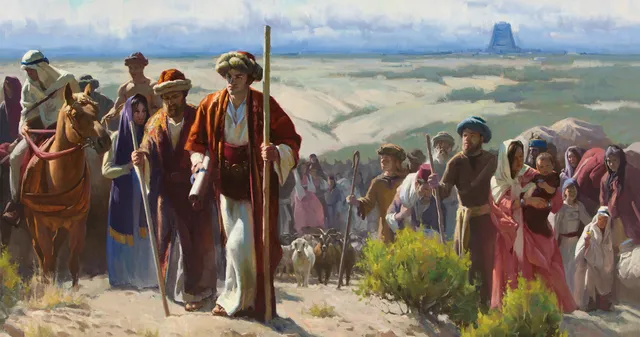
FAIR is a non-profit organization dedicated to providing well-documented answers to criticisms of the doctrine, practice, and history of The Church of Jesus Christ of Latter-day Saints.

“We Rejoice in Christ”
Book of Mormon Chapters: Ether 6-11
That Evil May be Done Away
Historical Context: These chapters recount the Jaredite journey to the promised land and their subsequent rise and fall. Moroni’s abridgment highlights themes of divine deliverance, the dangers of pride and secret combinations, and the role of prophets in calling people to repentance.
Resources:
These accounts serve as a warning for all people, highlighting the consequences of sin and the importance of repentance. Moroni specifically wrote for our time, urging readers to avoid the same pitfalls.
Resources:
Yes, Moroni warned of their presence among all nations and their aim to destroy freedom. Recognizing and opposing corruption in all forms is part of discipleship.
Resources:
Response:
The presence of horses in the Book of Mormon has been a point of contention, but several explanations and evidences provide a nuanced perspective. While mainstream archaeological consensus holds that horses were absent in the Americas between the end of the Pleistocene (roughly 10,000 years ago) and their reintroduction by the Spaniards in the 16th century, emerging evidence and interpretive frameworks offer plausible answers to this challenge.
Conclusion:
While direct archaeological evidence for horses in Book of Mormon times remains limited, the combination of scientific findings, interpretive possibilities like loanshifting, and cultural accounts provides a reasonable framework for understanding their mention. These factors align with the broader principle that lack of evidence is not necessarily evidence of absence.
Resources:
Response:
The daughter of Jared’s reference to a “record” in Ether 8:9 raises intriguing questions about the origins and transmission of knowledge regarding secret combinations. While the Book of Mormon does not explicitly identify this record, contextual clues suggest it could relate to a broader tradition of ancient records, including those brought from the Tower of Babel by the Jaredites or even records from the antediluvian world (before Noah’s flood).
Resources:
Response:
The brother of Jared’s opposition to kingship and King Mosiah’s subsequent rejection of monarchy in favor of judges are profound examples of the Book of Mormon’s internal consistency and its message about governance. These accounts also provide a compelling response to the criticism that Joseph Smith wrote the Book of Mormon, as they reveal complex narrative and doctrinal connections across centuries and different authors.
Mosiah’s decision directly reflects the lessons learned from the Jaredite record. The parallels between the Jaredites’ downfall under kings and the Nephites’ own vulnerabilities provide a clear justification for Mosiah’s reforms. This demonstrates a deep, internal logic in the Book of Mormon: Mosiah’s actions are informed by earlier records, reinforcing the book’s overarching themes of accountability and governance.
Resources:
This connection between Ether and Mosiah underscores the richness and authenticity of the Book of Mormon. Its interwoven narrative reflects divine inspiration and provides valuable lessons for individuals and societies alike.
If you have questions on this week’s reading, please email your questions to us here.
There are many principles to find in Ether 6–11. Some are highlighted in the lesson outline, but you will find others. Let Heavenly Father, through His Spirit, teach you what you need right now.
” — Joseph B. Wirthlin, Finding a Safe Harbor
1-10: The Jaredites prepare for their voyage to the promised land. They gather food for themselves and their livestock. The Lord provides a steady wind to blow them in the right direction. Their sea voyage is described.
11-18: After 344 days they reach the promised land. The entire company thanks God for His tender mercies. Many years pass. The Jaredites prosper and continue to honor God.
19-30: As Jared and his brother get older the people ask that they appoint a king from among their sons. Though hesitant, they agree. Only one, Orihah, who is Jared’s son, accepts the position.
1-6: Orihah rules in righteousness. His son, Kib, succeeds him. Kib’s son, Corihor, rebels against his father, draws away many followers and sets up his own kingdom in the land of Nehor. Corihor captures and imprisons his father, Kib.
7-13: Kib has a son while in captivity named Shule. When grown, Shule wages war against his brother, Corihor. Shule is victorious and reinstates his father, Kib, to the throne. In time, Kib turns governmental control over to Shule and eventually to a repentant Corihor.
14-20: Corihor’s son, Noah, wages war against Shule. Shule is taken captive, but freed by his sons. Noah is killed. One of Noah’s sons, Cohor, takes control of the land previously ruled by Corihor.
21-27: Cohor wages war against Shule, but is killed. Cohor’s son, Nimrod, gives the land of Corihor back to Shule. Prophets warn that the Jaredites are forgetting God. After an initial period of rejection, the Jaredites repent. Peace, prosperity and righteousness are restored.
1-6: Shule has a son named Omer who becomes king. Omer has a son named Jared. Jared rebels against his father, and persuades half of the community to join him as they establish the land of Heth. Shortly thereafter they wage war against Omer and capture him. Omer’s other children wage war against their brother, Jared, and are victorious. Jared surrenders his land to them.
7-18: Jared wants his kingdom back. His daughter devises a plan whereby she will seduce Akish and compel him to behead Omer. Akish gathers his family and they swear an oath of secrecy surrounding the upcoming murder of Omer.
19-26: Moroni pauses to comment on the danger of secret oaths and combinations. They are the work of the devil, as he ensnares the desires of men and women to gain power and dominion over others. Secret combinations will prove to be the downfall of the Nephites and Lamanites.
1-3: Omer is warned in a dream that his murder is being plotted. He and those in his family loyal to him escape to the land of Ablom.
4-6: Jared becomes king, and his daughter marries Akish. However, Akish, with the help of his secret society, murders Jared and procures the throne.
7-13:Akish worries that his son will conspire against him and imprisons him and subsequently starves him to death. Another son, along with a few others, flees to the land of Ablom. Akish’s other sons grow to maturity and incite a large portion of the community to war against Akish. All but 30 people are killed. Omer is reinstated as ruler.
14-25: Omer rules until his son Emer takes his place. The community flourishes and grows because the people turn again to God. They are blessed with peace and prosperity. Emer’s son Coriantumr becomes king upon Emer’s death. Coriantumr is followed by his son Com. Com has many children, one of whom is a son named Heth.
26-35: Heth kills his father and embraces wickedness. The community follows. Prophets warn that negative consequences will follow their evil choices, only to be ignored. The Lord sends a drought and poisonous serpents. Many people die, others flee, while those who remain repent. The Lord halts the “dearth.”
1-4: Heth and all his family die, save Shez. Shez begins to “build up a broken people.” They prosper until Shez’s death, when his son becomes king.
5-8: Riplakish abuses his powers as king, putting heavy loads on the people and imprisoning many for nonpayment of heavy taxes. After forty two years, the people rise up in rebellion, kill Riplakish and drive all his descendants from the land.
9-13: After many years one descendant, named Morianton, raises an “army of outcasts” and eventually regains control of all the lands previously controlled by Riplakish. Morianton is a just and well liked ruler even though he does not follow God’s laws, nor does his son Kim, who succeeds him. The community grows and prospers.
14-34: The rest of chapter 10 recounts multiple generations of the descendants of Kim. Some live in captivity while some are able to retake part or all of previously held lands. Jaredite lifestyle during this long period is described, with them generally enjoying prosperity. Chapter 10 ends with Com regaining rule over the Jaredite kingdom. There is a resurgence of robbers and secret combinations and they unfortunately begin to gain the upper hand.
1-3: During Com’s reign, prophets testify of coming destruction if the Jaredites do not repent. The prophets are rejected.
4-8: Com’s two son’s, Shiblom and his brother, battle for control upon the death of their father. Shiblom’s brother kills the prophets. Great calamities, as predicted by the prophets, afflict the Jaredites. Some repent.
9-23: Many rulers come and go, all being wicked and ignoring the warnings of the prophets. The Jaredites, as well, do not heed their messages. Secret combinations gain strength. Chapter 11 ends with Ether’s birth, the son of Coriantor.

I often compare the journey of the Jaredites to the promised land to that of Lehi’s family hundreds of years later. The journey for the Jaredites seems …
 I often compare the journey of the Jaredites to the promised land to that of Lehi’s family hundreds of years later. The journey for the Jaredites seems so much smoother in comparison. They relied on the Lord, built barges to carry them across the seas, and then departed, seemingly without many issues. The scriptures call attention to at least one thing that made the journey easier for the Jaredites—humility.
I often compare the journey of the Jaredites to the promised land to that of Lehi’s family hundreds of years later. The journey for the Jaredites seems so much smoother in comparison. They relied on the Lord, built barges to carry them across the seas, and then departed, seemingly without many issues. The scriptures call attention to at least one thing that made the journey easier for the Jaredites—humility.
Moroni described the Jaredites’ initial reaction to arriving in the promised land: “And when they had set their feet upon the shores of the promised land they bowed themselves down upon the face of the land, and did humble themselves before the Lord, and did shed tears of joy before the Lord, because of the multitude of his tender mercies over them” (Ether 6:12).
These humble Jaredites recognized that it was not their own strength that got them there, but that of the Lord. In contrast, Laman and Lemuel and others rejoiced in their own strength and ability to get to the promised land, which only caused problems on their journey.
 As the years went by, some of the Jaredites forgot to be humble, but those who showed humility saw no end to the blessings of the Lord in their lives, such as the blessings promised of the Lord in Doctrine and Covenants 112:10: “Be thou humble; and the Lord thy God shall lead thee by the hand, and give thee answer to thy prayers.”
As the years went by, some of the Jaredites forgot to be humble, but those who showed humility saw no end to the blessings of the Lord in their lives, such as the blessings promised of the Lord in Doctrine and Covenants 112:10: “Be thou humble; and the Lord thy God shall lead thee by the hand, and give thee answer to thy prayers.”
Wilford Woodruff counseled, “It is our duty to humble ourselves before the Lord and call upon his name until we are filled with the Holy Ghost and the spirit of inspiration.” When we humble ourselves, we can truly be led by the Lord and receive the strength and guidance we need.
[1] Ether 8:26, ChurchofJesusChrist.org
 Lyndie is working toward a degree in Public Relations at Brigham Young University. Originally from Idaho Falls, Idaho, she enjoys running, spending time with her husband and family, and reading. Lyndie served a mission for The Church of Jesus Christ of Latter-day Saints in Hermosillo, Mexico, where she developed a love for the Spanish language and the people there. She was drawn to the Wilford Woodruff Papers out of a desire to learn more about Church history and enjoys being part of the organization’s efforts to touch lives with Wilford Woodruff’s words.
Lyndie is working toward a degree in Public Relations at Brigham Young University. Originally from Idaho Falls, Idaho, she enjoys running, spending time with her husband and family, and reading. Lyndie served a mission for The Church of Jesus Christ of Latter-day Saints in Hermosillo, Mexico, where she developed a love for the Spanish language and the people there. She was drawn to the Wilford Woodruff Papers out of a desire to learn more about Church history and enjoys being part of the organization’s efforts to touch lives with Wilford Woodruff’s words.


FAIR is a non-profit organization dedicated to providing well-documented answers to criticisms of the doctrine, practice, and history of The Church of Jesus Christ of Latter-day Saints.
We are a volunteer organization. We invite you to give back.
Donate Now